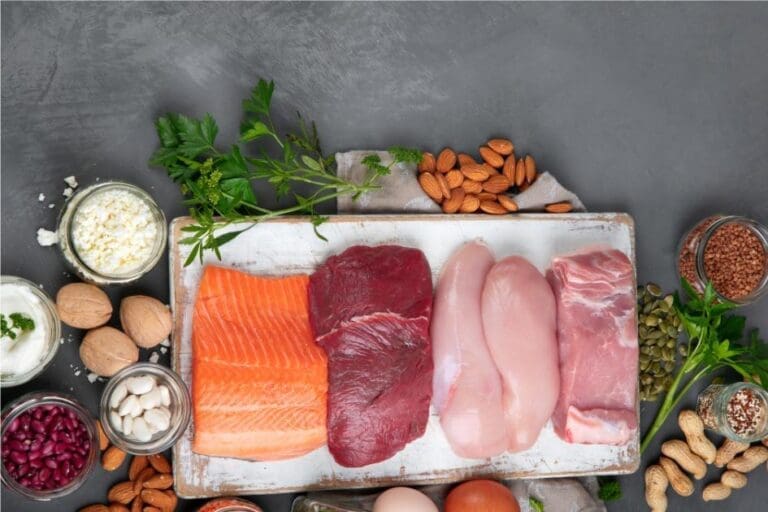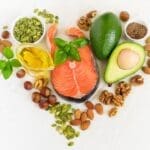Today, we’re diving into a crucial topic: protein. Whether you’re an athlete, a busy parent, or someone simply looking to enhance their diet, understanding the role of protein can make a significant difference in your health journey.
What is Protein?
Proteins are macronutrients composed of amino acids, which are often referred to as the building blocks of life. These amino acids play a vital role in almost every function of our bodies, from repairing tissues to supporting immune health. Of the 20 different amino acids, nine are considered essential, meaning our bodies can’t produce them on their own – we have to get them from our diet.
Why Protein Matters
1. Supports Muscle Health: You know that feeling of soreness after a workout? Protein is key here. It helps repair and build your muscles, whether you’re lifting weights at the gym or chasing after kids at home. Keeping your muscles strong and healthy means you can tackle whatever life throws your way with more ease.
2. Immune Support: Did you know that proteins are vital for your immune system? They help in the creation of antibodies and immune cells, which are crucial for fighting off illnesses. Eating enough protein ensures your body is better equipped to handle infections and recover faster.
3. Enzymes and Hormones: Proteins also act as enzymes and hormones, which regulate numerous bodily functions. From metabolism to mood regulation, these proteins ensure that everything runs smoothly.
4. Mental Health: Protein has a significant impact on mental health. Amino acids, the building blocks of protein, are necessary for the production of neurotransmitters like serotonin and dopamine. These neurotransmitters play crucial roles in regulating mood, sleep, and concentration. A diet rich in protein can help maintain balanced levels of these chemicals, potentially reducing symptoms of depression and anxiety and promoting overall mental well-being.
5. Metabolism and Body Composition: Protein helps maintain a healthy metabolism and body composition. It’s important for preserving muscle mass, which is especially crucial if you’re trying to lose weight. Muscle tissue burns more calories than fat tissue, even at rest, so including enough protein in your diet can support your weight management goals and help you feel satisfied after meals.
Sources of Protein
Incorporating protein into your diet is essential for overall health. Here are sources of protein to consider:
Red Meat: Red meat, such as beef and lamb, is a rich source of protein. It provides essential amino acids necessary for muscle maintenance and overall body function.
Poultry and Fish: Poultry (like chicken and turkey) and fish (such as salmon and tuna) are lean sources of protein. They offer high-quality protein and essential nutrients like omega-3 fatty acids.
Dairy Products: Dairy products like milk, yogurt, and cheese contain protein, calcium, and other essential nutrients. They are beneficial for bone health and muscle recovery.
Eggs: Eggs are a versatile protein source, providing all essential amino acids. They are also rich in vitamins and minerals like vitamin D and choline.
Legumes and Beans: Legumes (such as lentils and chickpeas) and beans (like black beans and kidney beans) are plant-based sources of protein.
Nuts and Seeds: Nuts (like almonds and walnuts) and seeds (such as chia seeds and flaxseeds) provide protein.
Processing Animal Product Protein vs. Plant and Seed Protein
Our bodies process and utilize animal product proteins differently from plant and seed proteins. Animal proteins, such as those found in red meat, poultry, fish, and dairy, contain all essential amino acids in proportions that are similar to what our bodies need. They are considered complete proteins. This makes them highly bioavailable and efficient for muscle repair, growth, and overall body function.
Plant and seed proteins often lack one or more essential amino acids or have them in lower amounts, making it necessary to consume a variety of plant-based protein sources to ensure a complete amino acid profile.
How Much Protein Do You Need?
How much protein you need depends on many factors, like your age, gender, weight, and activity level. If you’re trying to build muscle or are very active, you’ll need more protein than someone who isn’t as active. Your protein needs can also change if you’re pregnant, nursing, or dealing with certain health conditions. So, it’s important to consider your personal lifestyle and health goals when figuring out how much protein is right for you.
Incorporating Protein into Your Diet
Adding protein to your daily routine is both simple and delicious. Here are some great ways to boost your protein intake throughout the day:
Greek Yogurt: Start your day with a creamy bowl of Greek yogurt. It’s versatile and can be paired with fresh berries, nuts, or seeds for added flavor and nutrition. (Find our homemade greek yogurt recipe here.)
Archer’s Beef Sticks or Chomps Beef Sticks: For a convenient and protein-packed snack, try these beef sticks. They’re made with quality ingredients and perfect for on-the-go energy. (Buy Archer’s Beef Sticks here) (Buy Chomps Beef Sticks here)
Hard-boiled eggs: Portable and protein-rich, they’re a quick and easy snack option.
Whisps Cheese Crisps: Enjoy them on their own or with your favorite dip for a crunchy, protein-packed snack. (Buy Whisps Cheese Crisps here)
Cottage Cheese: Enjoy it plain or with fruit for a creamy and protein-packed snack.
Protein Bars: Look for bars with at least 10 grams of protein per serving for a convenient and filling option. We love Perfect Bars because they taste amazing and use quality ingredients. Just a friendly reminder: they contain some sugar, so if you’re keeping an eye on your sugar levels or managing diabetes, it’s something to look out for.
Cheese Sticks/Blocks: Grab a cheddar, mozzarella, or pepper jack stick for a tasty, protein-rich snack that’s perfect on the go.
Nuts and seeds: Almonds, walnuts, and pumpkin seeds provide protein and healthy fats.
Protein is a key player in maintaining overall health and wellness. By understanding its importance and incorporating a variety of protein-rich foods into your diet, you can support your body’s needs and feel your best.
We hope you found this information helpful! Cheers to a healthy, protein-powered week ahead!













